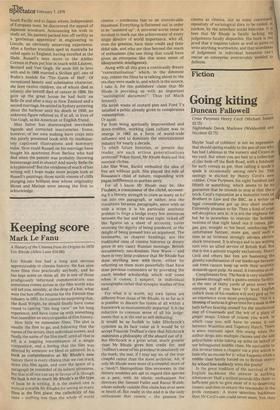Keeping score
Mark Le Fanu
A History of the Cinema from its Origins to 1970 Eric Rhode (Allen Lane £10.00) Eric Rhode has had a long and serious apprenticeship in cinema history. He has seen more films than practically anybody, and he has kept notes on them all. He is one of those prodigiously informed commentators, one sometimes comes across in the film world who will tell you, amiably, at the drop of a hat, what were the box office returns for the Finnish film industry in 1953. So it cannot be surprising that, like Basil Wright, he should finally have come round to casting "the long view" on his long experience, and have come up with something that resembles an encyclopaedia of film history.
How little we remember films. The plot is usually the first to go, and following that the names of the actors, then individual scenes, and finally the name of the film itself, until all that is left is a nagging remembrance of a single composition, and a feeling that the film was directed by someone we liked or admired. In a book as comprehensive as Mr Rhode's new history there is every chance that we can track down this film again, and over the space of a Paragraph be reminded of its salient pleasures. But that is all one can say in favour of it. though the fault is not so much Mr Rhode's as the type of book he is writing. It is the reason one is ironical towards Mr Rhodes for seeing so many films in the first place; the catholicity of his taste — nothing less than the whole of world
cinema — condemns him to an irretrievable blandness. Everything is flattened out in order to be "summed up". A universal aorist tense is invoked to mark out the achievement of every single director of world importance, who all, even the greatest, have their credit and their debit side, and who are thus beyond the reach of enthusiasm (the one thing that could have given an enterprise like this some sense of idiosyncratic intelligence).
Along with all this goes a continually dreary "contextualisation" which, in the dimmest way, relates the films he is talking about to the era they were made in, and which is the source, I take it, for the publishers' claim that Mr Rhode is providing us with an important "sociological document". Thus (of Mack Sennett):
His lavish waste of custard pies and Ford T's 'satisfied a public already given to conspicuous consumption.
Or again: Far from being spiritually impoverished and down-trodden, working class culture was to emerge in 1963 as a force of world-wide influence and to dominate the entertainment industry for nearly a decade.
To which future historian, or present day reader, are such artless generalisations preferred? Poker-faced, Mr Rhode deals out the sunniest cliches: Like Mae West, Bardot embodied the idea of free sex without guilt. She played the role of Rousseau's child of nature, responding with pagan indifference to puritan envy.
For all I know Mr Rhode may be, like Flaubert, a connoisseur of the cliché, accounting it a literary strength to cram as many as hc can into one paragraph, or rather, into the transitions between paragraphs, since with so wide a scope it is his particular aesthetic problem to forge a bridge every few sentences between the last and the next topic, ticked off like figures on a sheet of accounts, never receiving the dignity of being pondered, or the delight of being pressed into an argument. The landmarks, as chapter headings, are the traditional ones of cinema histories (a dreary genre in any case): Russian montage, British documentary, neo-Realism, New Wave — and there is very little evidence that Mr Rhode has done anything new with them, either by reflecting on them more powerfully than have done previous contenders or by providing the much needed scholarship which will come when it comes, I suspect, in individual monographs rather that synoptic studies of this kind.
For what it is worth, my own tastes are different from those of Mr Rhode, in so far as it is possible to discern his tastes at all within a framework so monumentally impartial. It is the reduction to common sense of all his judgements that is in the end so self-defeating:
It would be as foolish to take Hitchcock's cynicism as its face value as it would be to accept Francois Truffaut's view that Hitchcock elaborates a philosophy of the absurd out of it. But Hitchcock is a great artist, much greater -than Mr Rhode gives him credit for, and Truffaut's sense of his grandeur is absolutely on the mark; the test, if I may say so, of the true cinephil rather than the mere archivist. Ah, if only Mr Rhode were more of a cinephil, more of a "snob"! Metropolitan film reviewers in the literary weeklies are apt to regard this species as a pest, with its idiotic enthusiasm for directors like Samuel Fuller and Raoul Walsh, whom nobody outside film clubs has ever seen or heard of. But really in the end it is the only enthusiasm that counts — the passion for
cinema as cinema, not as some convenient repository of sociological data to be raided, at random, by the armchair social historian. It is here that Mr Rhode is fatally lacking, his judgements fatally disponible. His book is the proof that it requires talent as well as pains to write anything worthwhile, and thatsoundness of judgement in individual instances can't rescue an enterprise irretrievably wedded to dullness.


























 Previous page
Previous page